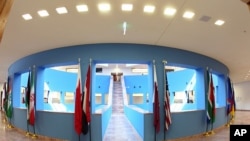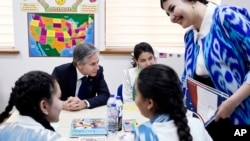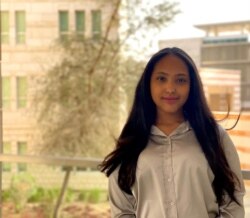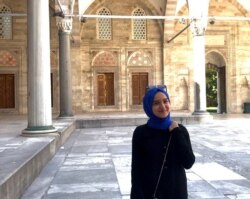Student Union
Code Yellow Has Student Quarantined in Qatar

My studies already disrupted by a 1,400 mile trip from Ethiopia, I heard my phone ping to tell me I’d be on the move again. This time, to a different COVID-19 quarantine facility, 20 minutes away.
My school — Northwestern University in Evanston, Illinois — is in the American Midwest, but I attend classes in Qatar, at the university’s Doha campus in the Gulf States region. I am working toward a bachelor’s degree in journalism, remotely, like most of the world’s students, because the COVID-19 pandemic has shuttered campuses and pushed classes online.
I had just returned from my home country, and was quarantined at a hotel in Doha for the standard seven days before I could join the general population. When the COVID-19 app on my phone failed to turn from quarantine yellow to go-ahead green by Day 7 after my entry COVID test, I knew I wouldn’t be set free.
My phone app — called EHTERAZ, or “precaution” in Arabic — is a contact-tracing and risk detecting app, operated by the Ministry of Public Health in Qatar and used by all residents and visitors.
While green indicates COVID-19 negative, yellow means quarantine, and red says COVID-19 positive. No one can enter an establishment, restaurant or mall unless the QR code on their EHTERAZ app shows a green health status.
I’d be going next to a special quarantine dormitory in Education City, a section of clustered universities, to wait for my app to turn green.
Education City (EC) hosts well-known, international universities, such as Weill-Cornell, Carnegie Mellon, Virginia Commonwealth, Georgetown, Texas A&M, and my school, Northwestern.
It is home to about 8,000 students. About half are Qataris. The rest come from Latin America, East and South Asia, and North and Sub-Saharan Africa and a few from Europe. Housing is divided by gender.
Started in 1997 with Virginia Commonwealth University, EC has slowly become a hotspot for other international satellite campuses.
Nearby, it hosts the sustainably designed Oxygen Park, known as the “green lung” of the 12-square-kilometer development, according to the Qatar Foundation website.
Other recreational, artistic and research facilities include the Al Shaqb riding club, showcasing Qatar’s long-standing equestrian culture of Arabian horses, and the Arab Museum of Modern Art, featuring modern and contemporary art from the Arab world.
It also hosts the glittering, expansive Qatar National Library, which is open to students. And the Education City Stadium, completed last year and earning a five-star Global Sustainability Assessment System certification, will be one of the venues for the 2022 FIFA World Cup matches.
In March 2020, when COVID-19 was declared a pandemic, some of the international students studying in EC cleared out for home. But many remained in Doha in lockdown.
In March, the Ministry of Public Health imposed lockdowns of almost all public spaces, such as retail stores, places of worship, entertainment, restaurants and cafes.
“Lockdown restrictions got extreme. Everything in the country was shut down, except for grocery stores,” said Azma Mulundika, a journalism sophomore at Northwestern University, from Zambia.
“I never left the dorms once the quarantine got severe because the cases were going up every day. It had reached 1,000-plus cases at some point, and that’s a really high number for such a small country,” explained Mulundika.
Most flights deemed high-risk for COVID were canceled. Students were afraid to travel home, worried that Qatar would close its borders and they wouldn’t be able to return to university. When outbound flights were available, students and residents had to complete extensive procedures.
“Traveling during that time from here to anywhere was such a lengthy process because you had to fill in all these documents and you had to get all these tests. And COVID tests are very uncomfortable,” Mulundika said.
“Coming back, you have to get quarantined. At some point it was two weeks, and then it recently reduced to one week, and you still have to quarantine when you go to the dorms,” she explained. “I just didn’t want to have to go through all of that.”
Sometimes the EHTERAZ notifications are delayed.
“After being in lockdown for seven days … you just want to go outside, see people, and interact,” said Mekdelawit Worku, a junior communications student at Northwestern University, from Ethiopia.
Students have reported a decrease participation and engagement with online classes.
“It’s not the quality [of the course content] but the actual lack of presence in the classroom,” said Worku. “When you’re present in the environment, you kind of feel obligated to be there. Home and class don’t necessarily go together.”
Other students report that online learning doesn’t work well with hands-on classes.
“Because we’re in science classes, a lot of our classes have labs that we need to be on site to do. And especially last year, a lot of our labs ended up being canceled,” said Zoha Baig, a second-year pre-med student at Weill Cornell University in Qatar.
“So, we basically have to try and take some sort of online counterpart instead of doing labs which made it harder to learn,” she said.
For students who remained in Doha, the Qatar Foundation, a non-profit organization responsible for launching Education City, fully covered housing and meals during the summer 2020.
But isolation and loneliness came with confinement, on top of maintaining schoolwork.
“I remember being sad, I remember being extremely depressed, and I remembered crying at some point,” Mulundika told VOA. “Being in quarantine and isolation by yourself is just kind of poison right now.”
“At first, I was just worried about people back home, my family and my friends all over the world,” Worku said. “But then I started to feel lonely when my family back home quarantined together and yet I was still here. As a student, you’re still stuck in this country and air travel is also shut down so you can't even go home even if you wanted to. Thinking about those things, there was a sense of feeling trapped but also grateful to be at a place where I have a good Wi-Fi and a safety net, to be honest.”
Selma Fejzullaj, a freshman student at Virginia Commonwealth University School of Arts arrived in Doha in September 2020 from Turkey. Fejzullaj took her classes online and had few opportunities to socialize.
“Until winter break, I did not have face-to-face interaction with my peers, as all my classes are online. All the activities I was attending were online clubs, so everything was through a computer screen,” said Fejzullaj.
As the pandemic drags on, students say the university experience is lacking.
“Right now, I do not feel as a university student since I did not have the university experience. I still cannot comprehend the fact that my freshman year will finish in less than 20 days. So, I really do hope that we go back to normal,” said Fezjullah. “I cannot see myself finishing my sophomore year also like this.”
Qatar is planning a controlled re-escalation of COVID-19 restrictions following a steady increase in the number of COVID-19 cases over the past few weeks, according to the Ministry of Public Health in February.
A few classes are resuming on a hybrid basis but almost all classes are online. Use of the library or a lab is allowed only for the COVID-19 negative. The app alerts users when they are near individuals with yellow or red status.
The Ministry of Public Health in Qatar has approved the Pfizer and BioNTech COVID-19 vaccine, and it will provide them to citizens and residents in Qatar for free. Students are eager for vaccination efforts to include them.
Sitting in quarantine in EC, I thought about how returning to Qatar would get me the vaccine earlier than if I had stayed back home.
Finally, my phone pinged again, and a green barcode appeared. I was elated, but exhausted, and promptly took a long nap once I reached my dormitory.
See all News Updates of the Day
- By VOA News
Michigan State international students get their own space

Michigan State University in East Lansing, Michigan, is setting aside a space in the International Center for international students.
Nidal Dajani, vice president of the school's International Student Association, said that the club plans to use the space to host events and hopes to collaborate with other student groups.
- By Dylan Ebs
International students find community during Pride Month

For LGBTQ+ international students, Pride Month, observed in June, is a unique time to reflect.
They hold on to multiple identities — both their LGBTQ+ identity and their cultural background — but coming to terms with them is not always easy.
For graduate student David Zhou, these identities can feel conflicting as transgender rights in China remain a controversial issue and spaces for LGBTQ people close. Zhou, 25, is transgender and pursuing an education in the STEM field at an urban university in the Midwestern United States.
VOA is using a pseudonym for Zhou’s first name and is not naming his university to protect his identity due to safety concerns back home in China. Zhou is not open about his transgender identity to his family.
During Pride Month, Zhou said he attended multiple LGBTQ+ events in his community and is surrounded by a supportive group of LGBTQ+ students who can relate to his experiences. But he’s not open about his identity to everyone on campus and said he doesn’t disclose his preferred pronouns to everyone to avoid transphobic comments.
“I feel like I have to make some judgments of the character of that person to see if they’re a good person to disclose [my identity] to,” Zhou said.
Zhou’s Pride Month celebrations included attending local markets with LGBTQ+ vendors and hanging out with his LGBTQ+ friends.
“They normalized being trans and for a long time I feel like trans identity is, should I say a vulnerability, brings me fear and worrying about discrimination, but having those events are helpful because it allowed me to see that queer people could just [live] openly,” he said.
At social events where few international students are present, Zhou said it can be tough to fit in.
“There's a lot of times like when they were talking about things I kind of, don't really understand, mostly because I kind of lack some background experience or knowledge,” he said.
Zhou said he is not aware of specific groups for LGBTQ+ international students at his university, but said international students are more prevalent in graduate programs and therefore find representation in organizations for LGBTQ+ graduate students.
In China, transgender individuals must obtain consent from an “immediate family member,” even for adults hoping to transition, which critics say limits the autonomy of transgender individuals while supporters say the policy protects doctors from violence by upset parents.
Struby Struble, a former coordinator of the University of Missouri LGBTQ+ Resource Center, told NAFSA: Association of International Educators in 2015 that LGBTQ+ international students face a “double barrier” on campus.
“With their international student friends, they feel isolated because they’re the LGBT one,” she said. “But then among the LGBT students on campus, they feel isolated because they’re the international one.”
Nick Martin, associate director of the Q Center, Binghamton University’s LGBTQ+ student support office, said when international students tour the center, there’s often a sense of hesitation as they enter a type of space that may not be present in their home country.
“I compare that to a year in after they've come into the space, they've again, maybe come to some of our events, they've got more connected,” he said.
Martin said graduate students have a unique interest in the Q Center as they may use the office for research and advocacy purposes that align with their studies.
“For older students, there may be hesitancy in a different way, but I think it's more in the vein of they want to do some of the advocacy work,” he said.
Martin said he thinks about how both his office and BU’s international student office can support students who come from countries with few — if any — protections for LGBTQ+ individuals.
“It's been a learning process of what those students really need, but I think I've kind of learned that a lot of students are just looking for the safe space that we offer,” Martin said.
- By VOA News
International students discuss US campus culture shock

International students at De Anza College in Cupertino, California, talked about culture shock in an article in La Voz News, the student newspaper.
"It felt like a major culture shock. Everything was so different, from academics to mannerism," said a student from Mexico.
Read the full story here.
These are the most expensive schools in the US

High tuition costs along with housing and food expenses can add up for students at U.S. colleges and universities.
MSNBC looked at the most expensive schools in the country, with one costing more than $500,000 for a bachelor’s degree. (June 2024)
Uzbekistan students admitted into top US universities

Students from Uzbekistan are among the international students admitted to top colleges and universities in recent years.
Gazata.uz profiled some of the Uzbekistan students attending Harvard, Brown, Princeton and other U.S. universities. (June 2024)











